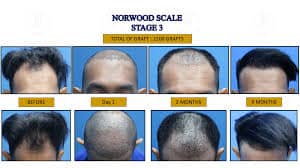Hair Transplant: Who is The Good Candidate?
Hair transplantation is a proven and effective solution for hair loss in men and women. Besides giving your hair back, it can restore your appearance and restore a person’s self-confidence and self-esteem, especially to those that have gone through a traumatic experience that may have been the cause of their hair loss.
Sickness, medical treatments and accident related injuries are some of the more extreme causes of hair loss but there are many other reasons why a person may seek out a hair transplant, including as a remedy to hereditary pattern baldness and thinning hair (Androgenic Alopecia).
Let us call you

How does a hair transplant work?
The healthcare provider takes grafts, or small pieces of skin, from areas of the body that contain healthy hair. Healthcare providers call this area the donor site. It’s usually on your head, at the back of your scalp where hair tends to be thickest. The healthcare provider moves the grafts to hairless parts of the scalp. Once the transplanted skin heals, it should continue to grow hair.
What Makes a Good Candidate For a Hair Transplant?
An ideal candidate for hair transplant surgery is just about anyone who would like to improve their appearance. Patients come in for help with thinning areas on the scalp, creating bald spots at the crown of your head, and restoring a receding hairline as well as helping maintain eyebrows, beards, or mustaches that are starting to go away too.
Within the Ideal Age Range
For the most part, one’s hair loss pattern is quite established between the ages of 25-65. For patients younger than 25, they are still experiencing premature hair loss. This can always change once they grow older. On the other hand, patients over the age of 65 tend to have very thin hair and this solution might not work best at that point. Someone who is completely bald or has very little hair left cannot get a hair transplantation surgery because there is little to no hair to transplant. This can present itself as a fundamental issue in terms of the final result.
No Health Complications
Before considering any type of surgical procedure, you need to be healthy enough for the surgery and have a healthy immune system. To reduce complications risks, ensure serious medical conditions are treated before going through with it. If these things aren’t done your blood sugar may not stabilize or they might cause other side effects that can harm your body even more than if you didn’t get the operation in the first place! If you have suffered from pre-existing health issues, it is recommended that you speak to your doctor before undergoing such a procedure.
Type of Hair Loss
The best candidates for hair transplantation are those who suffer from pattern baldness. There are many other serious conditions that could cause hair loss, yet the one that is best able to be worked with is Androgenetic Alopecia (male/female pattern baldness).This is usually a genetic condition that affects only parts of the scalp, therefore leaving parts with good donor hair that can be extracted, also called donor hair follicles. Patients suffering from more serious forms of alopecia or other types of hair loss will tend to have poor hair follicles. This can impact the success of the transplant.
Healthy Donor Supply
Two important factors must be considered when assessing the amount of hair loss: (1) the severity of hair loss in patients will play a crucial role in whether they will make a good candidate, and (2) the amount of healthy hair available for transplantation. This is an important step in deciding if a patient qualifies for hair transplantation, since there must be a good supply of healthy hair follicles available for hair transplantation to be successful. Inevitably, in order to be able to transfer hair from one area of the scalp to the affected areas, there must be a good supply of healthy hair follicles available.

At Hair Transplant Centre Malaysia, we evaluate each hair loss patient using a comprehensive and proven methodology to determine the cause of your hair loss. With this information, we can determine the cause of hair loss and develop an approach best suited to your condition and goals. Schedule your appointment today!


